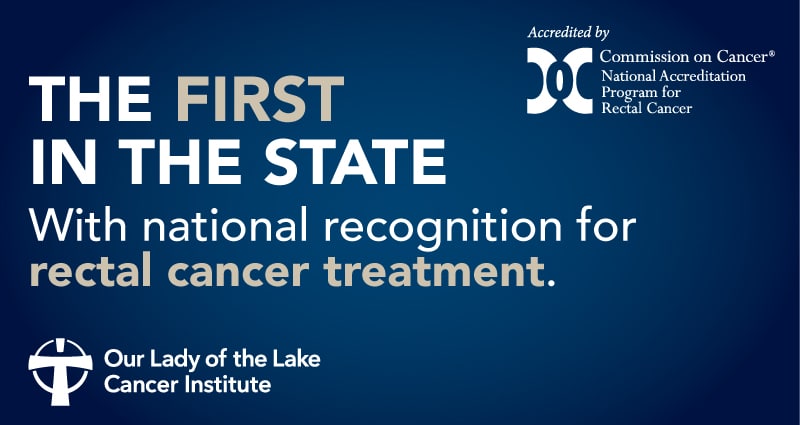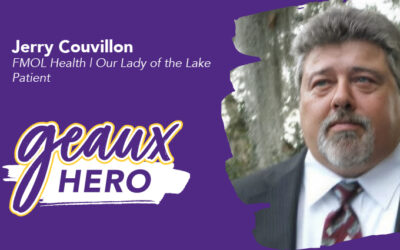Our Lady of the Lake Health is maintaining its status as Louisiana’s first healthcare institution with an official accreditation from the National Accreditation Program for Rectal Cancer (NAPRC) in recognition of its high-quality care for rectal cancer.
The hospital was first awarded the accreditation in 2019. The program was launched by the nationwide Commission on Cancer after data showed that across the country, there was significant room for improvement in rectal cancer treatment and patient outcomes.
Kelly Finan, MD, specializes in colon and rectal surgery at Our Lady of the Lake Cancer Institute and has played a leading role in the NAPRC accreditation process.
Dr. Finan says the hospital embraced the opportunity to receive accreditation because the staff knew they had a team of talented clinicians, but there were some gaps in terms of communication, standardization of treatment and maximizing each patient’s potential outcomes.
“We’re really proud of the work that we’ve done, not only for our initial accreditation, but to maintain it. We’ve been at this for five years now and we’re excited about the advances we’ve made and are continuing to make to improve colorectal cancer care in our community,” Dr. Finan says.
When a rectal cancer patient begins treatment at Our Lady of the Lake, a regimented approach is implemented. This begins with a clinical exam and numerous tests, Dr. Finan says, including MRIs, blood tests and CT scans, to determine the stage of the cancer, whether it has spread to other parts of the body, and what the most appropriate treatment will be moving forward.
“Once we have that information, every single patient’s case is presented at a multidisciplinary team meeting where our team of dedicated colorectal surgeons, radiation oncologists, medical oncologists, radiologists and pathologists review those details,” Dr. Finan says. “Once we review the entire diagnostic workup, we discuss it as a group to develop an individualized treatment plan for each patient. We know that determining the appropriate stage up front is so important as this drives our decision to move forward with surgery, chemotherapy and or radiation and in the correct sequence. It puts us in a position to make the right decisions at the very beginning so that no detail that could affect outcome falls through the cracks.”
Dr. Finan notes that the Our Lady of the Lake team’s development has also been due to its willingness to receive feedback and education from world-renowned experts and colleagues in other countries who have experience in treating rectal cancer.
“It’s a complex disease process,” she says. “We are really proud to have been in the forefront of this movement and be one of the first 20 NAPRC accredited sites in the country and the first one in Louisiana. We’ve gained a lot of education from this process and we’re still learning. Since we started on this journey, we have seen enhancements in genetic implications on targeted chemotherapy and immunotherapy, we have adjusted our treatment sequence for advanced tumors to administer chemotherapy and radiation upfront. We are finding complete tumor response rates in 40-50% of patients who are able to avoid surgical management. We have incorporated advanced surveillance protocols and have made enhancements in our longitudinal care through care coordinators to enhance survivorship. The sky is the limit and we are aiming high. When you have people who work on this every day, you really enhance the knowledge among the team.”
The accreditation comes as the United States continues to see a rise in colorectal cancers in people under age 50. Dr. Finan says that because of that trend, the American Cancer Society recommends that people begin colorectal cancer screenings at age 45. It’s still unclear why more younger people are being diagnosed, but Dr. Finan says genetics and environmental factors could both play a role.
However, there are steps people can take to reduce their colorectal cancer risk. Dr. Finan says these include limiting alcohol consumption, stopping smoking, eating a heart-healthy diet and remaining physically active.
“By taking these steps and having regular screenings, a person can reduce their risk of colorectal cancer or we can diagnose it much earlier when the chance of cure is greater,” she says. “If we identify and remove a polyp with a screening colonoscopy, we can prevent the occurrence of cancer. Early intervention is the key.”
In addition to its NAPRC certification, Our Lady of the Lake Cancer Institute was named a 2017 Outstanding Achievement Award winner by the American College of Surgeons Commission on Cancer, a distinction earned by only the top 7 percent of cancer centers nationwide. The institute has received numerous other national accreditations and honors that demonstrate its oncology practice meets the highest standards for cancer care.




